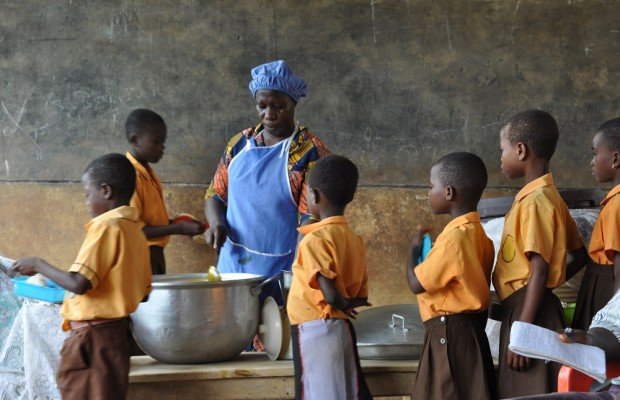The National Coordinator of Ghana School Feeding Programme, Madam Gertrude Quashigah says her Secretariat will soon train caterers to spend less on cooking nutritional foods for school children.
She said the training would help them to rake in profits by cutting down on costs and food wastage in their pantries.
Madam Quashigah who was addressing a day's workshop on the 'Dissemination of Landscape Analysis Report on Rice Fortification,' stressed that this would help them to put to good and sufficient use the GHS1.00 per child they receive.
This workshop shared findings of a comprehensive report on rice fortification and discussed strategies to enhance the nutritional value of school meals through rice fortification.
The dissemination workshop is the commencement of a two-and-a-half-year project by the World Food Programme, with funding support from the Rockefeller Foundation and Royal DSM, to improve the nutritional needs of school children through the Ghana School Feeding Programme.
The project seeks to improve the nutritional value of rice for the school children to meet their nutritional needs since rice was a staple.
Madam Quashigah said, though the amount they received needed to be increased, they could still cook nutritious foods for the school children with it.
She said they had recently agreed on a proposed increment from GH₵1.00 they received per child head to GH₵1.20 pesewas, saying they were still engaging the Finance Ministry on further increment.
She added that such training would be certificated through which they would be able to sort and assess their work.
Madam Patience Asiedu, Head of Nutrition, World Food Programme (WFP) Accra, said the project supported the Government’s efforts to boost local production of rice.
The capacity of 5,000 smallholder farmers and 10 rice millers will be enhanced to support local rice production for the School Feeding Programme, she said.
She said under the project, caterers and cooks would be trained to cook nutritional foods for the school children.
The Ghana School Feeding Programme as an intervention by the Government of Ghana, started in 2005 to provide food to children in public basic schools from kindergarten to primary six.
The Programme aims to increase school enrolment, attendance and retention, reduce short-term hunger and malnutrition and boost domestic food production.
The Programme has 3,801,491 beneficiary pupils, 34,350 cooks and caterers and covers 10,832 public basic schools nationwide.
Latest Stories
-
Brassier scores winner for Brest as they edge Rennes to secure European football
14 mins -
‘What are the real causes of the erratic power outages?’ GUTA demands from ECG
36 mins -
Implementing ESG framework in Ghana’s energy sector for sustainability
1 hour -
CAFCC: Dreams FC exit competition after 3-0 defeat in Kumasi
1 hour -
The detrimental effects of political interference on Ghana’s electricity sustainability
1 hour -
Prof. Opoku-Agyemang’s appointment as running mate intimidates the NPP – Benjamin Quashie
1 hour -
Black Stars physical trainer dead
1 hour -
Bawumia to kick off nationwide campaign for Election 2024 tomorrow
1 hour -
GUTA charges ECG to provide ‘dumsor’ timetable for businesses to plan
1 hour -
Reason for training professional counsellors is to heal a hurting world – CCP president
4 hours -
Woman allegedly brings dead man to bank to take out a loan
4 hours -
It’s a good feeling to score against PSG because I’m a Marseille boy – Andre Ayew
4 hours -
Joe Lartey Sr: A voice that brought life to Ghana sports and beyond
5 hours -
Bawumia promises to tackle issue most dear to Ghanaians as he begins nationwide campaign
6 hours -
Indian couple donate $24m fortune to charity to adopt monkhood
6 hours

